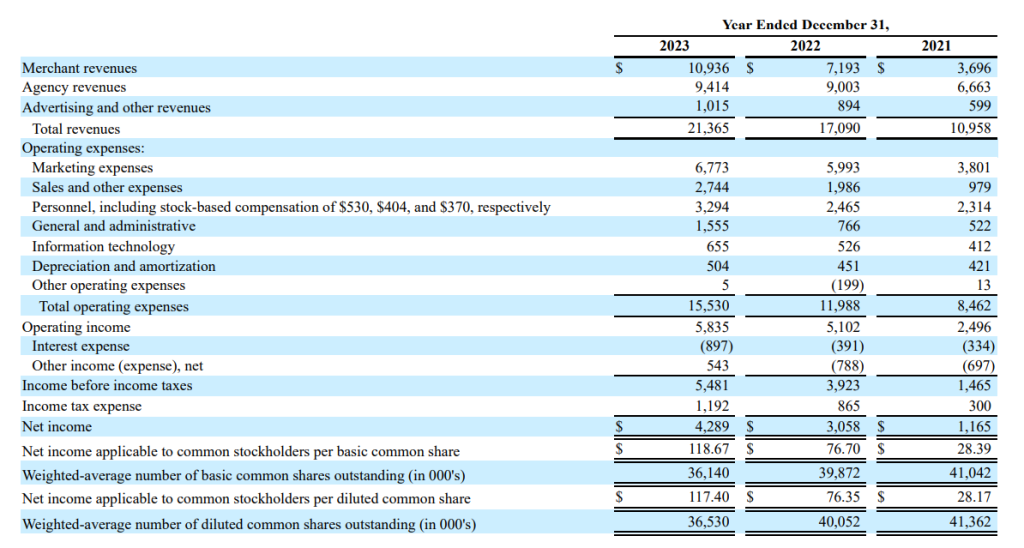Booking.com, headquartered in Amsterdam, is one of the largest online travel agencies. It is a subsidiary of Booking Holdings. In 1996, Geert-Jan Bruinsma, a student at Universiteit Twente, founded Bookings.nl. In 2000, Booking.com was formed when Bookings.nl, merged with Bookings Online. The name and URL were changed to Booking.com, and Stef Noorden was appointed as its CEO.
In this strategy story, we analyzed the business model of Booking.com and understood how does it work and make money. What is the marketing strategy of Booking.com?
Booking.com connects consumers wishing to make travel reservations with travel service providers around the world through its online platforms, allowing consumers to book a broad array of accommodations (including hotels, motels, resorts, homes, apartments, bed and breakfasts, hostels, and other alternative and traditional accommodations properties) and a flight to their destination; make a car rental reservation or arrange for an airport taxi; make a dinner reservation; or book a vacation package, tour, activity, or cruise.
Consumers can also use Booking.com’s meta-search services to easily compare travel reservation information, such as flight, hotel, and rental car reservations, from hundreds of online travel platforms at once. In addition, Booking.com offers other services to consumers and partners, such as travel-related insurance products and restaurant management services to restaurants.
How does Expedia make money: Business Model & Marketing Strategy
Booking.com offers these services through six primary consumer-facing brands: Booking.com, Priceline, Agoda, Rentalcars.com, KAYAK, and OpenTable. Booking.com continues to increase its brands’ collaboration, cooperation, and interdependency to provide consumers with the most comprehensive services and maximize the benefits of Booking.com’s scale.
For example, when a traveler books accommodation through Booking.com, it may offer relevant rental car or airport transfer transportation services supported by its Rentalcars.com brand. Hotel reservations available through Booking.com are also generally available through Agoda and Priceline. The following table shows the key services Booking.com offers to consumers:
How does Booking.com work?
Booking.com’s business is supported by multiple systems and platforms designed to emphasize scalability, performance, reliability, redundancy, and security. These systems and platforms are generally independent among Booking.com’s brands, though some have become more connected or shared over time.
Booking.com’s software systems, platforms, and architecture use a variety of widely-used software tools and database systems. Booking.com is modernizing its technology by building new applications with modern development tools and application programming interfaces and moving certain systems and data to public cloud infrastructure.
These internal systems and platforms are designed to include open application protocol interfaces that can provide connectivity to vendors in the industries in which Booking.com operates. These include large global systems, such as accommodation, flight, and rental car reservation systems, financial service providers, and individual accommodation service providers.
Booking.com’s applications utilize digital certificates to help Booking.com conduct secure communications and transactions. The systems infrastructure and web and database servers of Booking.com’s worldwide operations provide network connectivity, networking infrastructure, and 24-hour monitoring and engineering support typical of hosted data centers.
Booking.com has a multi-brand business model. Booking.com operates multiple brands, allowing it to offer services that appeal to different consumers, pursue distinct marketing and business strategies, encourage experimentation and innovation, provide numerous service offerings, and focus on specific markets or geographies.
At the same time, Booking.com continues to increase the collaboration, cooperation, and interdependency among its brands to provide consumers with the most comprehensive and value-oriented services. Booking.com invests resources to support organic growth by brands through increased marketing, geographic expansion, technological innovation, or increased access to accommodations, flights, rental cars, restaurants, or other services.
Service Offerings
Booking.com and Rentalcars.com: Booking.com is the world’s leading brand for booking online accommodation reservations based on room nights booked, with operations worldwide and headquarters in the Netherlands. In 2021, Booking.com offered accommodation reservation services for approximately 2.4 million properties in over 220 countries and territories and in over 40 languages, consisting of over 400,000 hotels, motels, and resorts and over 1.9 million homes, apartments, and other unique places to stay.
Priceline: Priceline is a discount travel reservation business leader offering online travel reservation services primarily in North America. Priceline offers consumers hotel, flight, and rental car reservation services and vacation packages, cruises, and hotel distribution services for partners and affiliates.
Agoda: Agoda is a leading online accommodation reservation service catering primarily to consumers in the Asia-Pacific region, with headquarters in Singapore and operations in Bangkok, Thailand, and elsewhere. Agoda also offers flight, ground transportation, and activity reservation services.
KAYAK: KAYAK provides an online price comparison service (often called “meta-search”) that allows consumers to easily search and compare travel itineraries and prices, including airline tickets, accommodation reservations, and rental car reservation information, from hundreds of online travel platforms at once. KAYAK offers services in over 60 countries, with its largest market in the United States, through various websites, including momondo, Cheapflights, and HotelsCombined.
OpenTable: OpenTable is a leading brand for booking online restaurant reservations. With significant operations in San Francisco, California, OpenTable provides online restaurant reservation services to consumers and reservation management services to restaurants, primarily in the United States. How does OpenTable make money | Business model
Marketing Strategy of Booking.com
The marketing strategy of Booking.com relies on marketing channels to generate a significant amount of traffic to its platforms and grow business. Maintaining and strengthening the brands are important aspects of Booking.com’s marketing strategy to attract and retain customers.
Booking.com have invested considerable resources in establishing and maintaining its brands. Booking.com intends to continue investing resources in marketing and other brand-building efforts to preserve and enhance consumer awareness of its brands when and to the extent Booking.com deems appropriate.
Booking.com’s marketing spend is influenced by the marketing spend of the competitors as it seeks to maintain and increase brand recognition and maintain and grow traffic to its platforms through performance marketing channels.
How does Booking.com make money? What is the business model of Booking.com?
Booking.com made $21.4 billion in 2023. Booking.com has a multi-brand business model. Booking.com primarily makes money from providing online travel reservation services, which facilitate online travel purchases between travel service providers (“partners”) and travelers (“consumers”). Booking.com also makes money from advertising services, restaurant reservations, and various other services, such as travel-related insurance products and restaurant management services for restaurants.
Booking.com classifies its revenue streams as “agency” revenues, “merchant” revenues, and “advertising and other” revenues.

Agency revenues are derived from travel-related transactions where Booking.com does not facilitate payments from travelers for the services provided. Agency revenues consist almost entirely of travel reservation commissions from Booking.com’s accommodation, rental car, and airline reservation services.
Merchant revenues are derived from transactions where Booking.com facilitates payments from travelers for the services provided, generally at the time of booking. Merchant revenues include travel reservation commissions and transaction net revenues (i.e., the amount charged to travelers less the amount owed to travel service providers); credit card processing rebates and customer processing fees; and ancillary fees, including travel-related insurance revenues.
How does Tripadvisor work and make money: Business Model
Advertising and other revenues are derived primarily from (a) revenues earned by KAYAK for sending referrals to online travel companies (“OTCs”) and travel service providers and for advertising placements on its platforms and (b) revenues earned by OpenTable for its restaurant reservation services and subscription fees for restaurant management services.

















